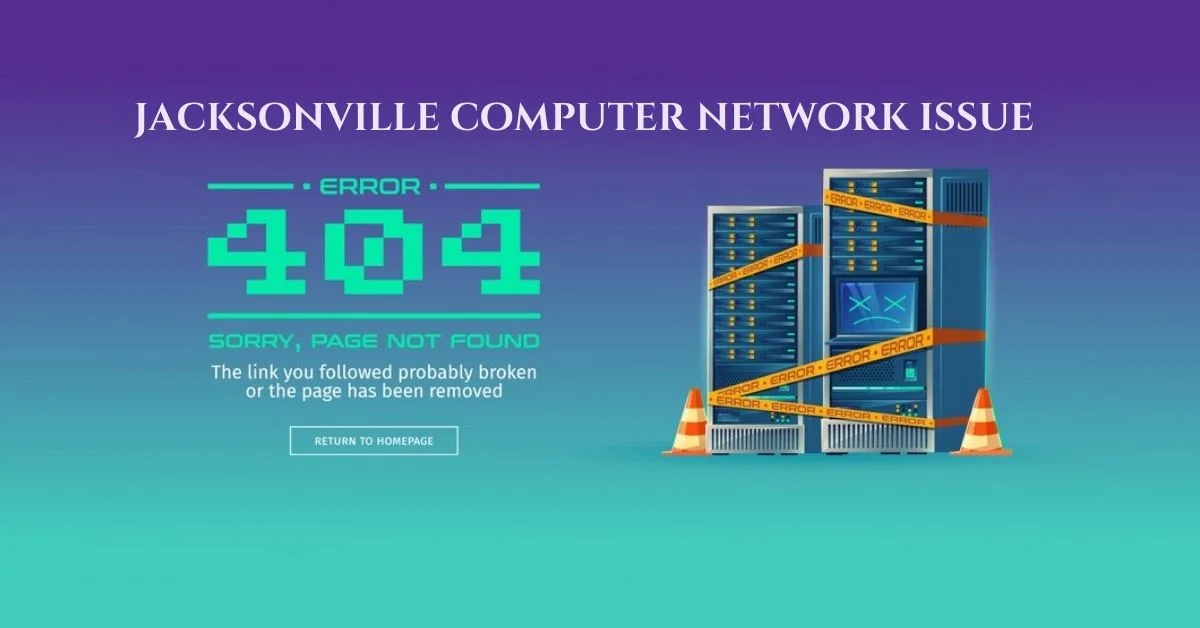The Jacksonville computer network issue has become a significant concern for both public and private sectors in the city, impacting everything from local government services to small business operations. As of early June 2025, the growing instability in Jacksonville’s network infrastructure has revealed vulnerabilities that require urgent attention. This article explores the origin, effects, responses, and long-term implications of the crisis, offering a comprehensive look into one of the most disruptive IT breakdowns in Jacksonville’s recent history.
Overview of the Jacksonville Computer Network Infrastructure
Jacksonville, Florida, known for its sprawling city layout and booming tech ecosystem, relies on a complex computer network that supports municipal services, financial institutions, healthcare systems, educational institutions, and more. The city’s network infrastructure integrates fiber optics, wireless technology, and cloud computing platforms to ensure efficiency and digital resilience.
However, in May 2025, system administrators and IT staff began noticing performance lags, abnormal traffic patterns, and erratic server behavior. Initial warnings were downplayed as minor software bugs, but within days, the problem escalated to a full-blown Jacksonville computer network issue, halting digital communications across various sectors.
Timeline of the Disruption
May 14, 2025: City employees reported difficulties logging into internal databases and cloud platforms.
May 16, 2025: Several local businesses experienced server crashes and billing system outages.
May 18, 2025: The city’s emergency dispatch network briefly went offline, prompting concerns over public safety.
May 20, 2025: Jacksonville Public Library and local school systems suspended digital services.
May 21, 2025: Officials confirmed a widespread Jacksonville computer network issue affecting both wired and wireless communications.
By the end of May, the city had begun working with federal cybersecurity experts to diagnose the root of the issue and develop a coordinated response plan.
Immediate Impacts Across Sectors
Government and Public Services
City hall, utility departments, and law enforcement agencies were among the first to feel the heat of the network failure. Residents reported delays in garbage collection, traffic ticket processing, and public record requests. The city’s budget management software went offline, preventing the release of municipal payroll for a brief period.
Healthcare Systems
Hospitals and clinics across Jacksonville found themselves reverting to paper-based systems. With Electronic Health Records (EHR) inaccessible, diagnosis and treatment plans slowed dramatically. Medical staff had to rely on manual charting, increasing the risk of error.
Educational Institutions
School districts operating under the Duval County Public Schools umbrella were severely impacted. Students and teachers lost access to virtual classrooms, online assignments, and grading platforms. Exams scheduled via digital portals had to be postponed or canceled entirely.
Small and Medium-Sized Businesses
From real estate offices to local retail chains, the Jacksonville computer network issue disrupted customer service, online payment gateways, and inventory systems. Small business owners voiced frustration over the lack of clear communication from internet service providers and city IT authorities.
The Root Cause: Software Flaw or Malicious Attack?
Initial speculation pointed to a routine software update that may have introduced a bug into core networking systems. However, cybersecurity analysts raised red flags about possible external interference. A forensic audit conducted by the Jacksonville IT Response Team revealed anomalous login attempts and data traffic patterns consistent with a coordinated cyberattack.
While no group has claimed responsibility, the investigation remains open. Experts from the FBI’s Cyber Division were dispatched to assess the probability of ransomware or state-sponsored intrusion.
Some critics argue that city officials failed to invest adequately in cybersecurity upgrades over the past decade, citing outdated firewalls and a lack of staff training in digital hygiene. The resulting Jacksonville computer network issue is, in their view, a wake-up call for proactive governance.
Public Response and Communication Challenges
Residents and businesses expressed growing discontent over the lack of real-time updates during the crisis. City officials were criticized for releasing vague statements that did little to alleviate public concern. Social media channels became the primary source of information, often spreading rumors that further fueled anxiety.
To combat misinformation, Jacksonville’s Communications Department eventually launched a live dashboard providing updates on system restorations and estimated timelines. This move was widely praised, although many felt it came too late to rebuild trust.
Economic Repercussions
The financial toll of the Jacksonville computer network issue is expected to reach millions. Local businesses reported a 30–40% decline in revenue during peak disruption days. Critical sectors such as healthcare and finance will likely face increased insurance premiums and compliance fines if found to have violated digital security protocols.
The city has also committed to funding a third-party audit to evaluate the long-term cost and propose infrastructure enhancements. It’s clear that the incident has highlighted the economic fragility of digital dependence.
Legal and Regulatory Implications
City attorneys are now examining potential legal liability, especially concerning data privacy laws. If sensitive information was compromised during the incident, Jacksonville could face class-action lawsuits or state penalties under Florida’s Cybersecurity Act.
In parallel, state legislators are proposing new guidelines requiring all Florida municipalities to conduct annual third-party cybersecurity audits. These regulations aim to prevent another Jacksonville computer network issue by establishing mandatory safeguards and early detection mechanisms.
National Attention and Federal Involvement
The scope of the network failure has drawn national attention. Jacksonville is not the only city with aging digital infrastructure, and many municipalities are now conducting their own network health checks. Homeland Security’s Cybersecurity and Infrastructure Security Agency (CISA) issued an advisory encouraging all local governments to review their endpoint security protocols.
Congressional leaders are also considering bills that would allocate federal grants to upgrade municipal IT systems, especially in vulnerable regions. Jacksonville may become the case study that drives this national investment forward.
Technology Partners and Vendor Accountability
Vendors supplying Jacksonville’s networking equipment and software are under scrutiny. While some experts believe that vendor negligence contributed to the problem, others argue that the city’s fragmented procurement system played a larger role.
To address this, Jacksonville officials are drafting a centralized vendor management framework that includes stricter vetting procedures, clearer service-level agreements (SLAs), and accountability clauses in future contracts.
Long-Term Solutions and Strategic Investments
As Jacksonville moves from crisis to recovery, several key investments are being proposed:
Infrastructure Modernization: Upgrading routers, firewalls, and cloud storage systems to meet industry standards.
Cybersecurity Training: Mandating cybersecurity workshops for all public-sector employees.
Disaster Recovery Planning: Creating redundancies and automated failovers to ensure service continuity.
Community Education: Launching awareness programs to educate the public on phishing, data privacy, and secure browsing habits.
These measures aim to ensure that a Jacksonville computer network issue of this scale never happens again.
The Role of Private Sector Collaboration
Private tech companies based in Jacksonville have stepped forward to assist. Several firms have offered free consulting hours, software patches, and temporary data hosting solutions. Collaborations with Jacksonville’s local universities are also underway to analyze system logs and simulate similar threat scenarios for academic study.
This collaborative spirit showcases how public-private partnerships can play a pivotal role in strengthening citywide resilience.
Digital Trust and Civic Engagement
Beyond the technical and financial dimensions, the Jacksonville computer network issue has sparked important conversations about digital trust. Residents now expect more transparency, reliability, and accountability from their local government’s tech operations. Civic tech groups are organizing town halls and forums to discuss digital rights, open data, and participatory governance models.
As one community leader put it, “We cannot afford to be digitally blind. The future of city living is digital, and we must treat digital infrastructure like any other public utility.”
Looking Forward: Lessons from the Crisis
While the full impact of the Jacksonville computer network issue will take months to assess, several lessons have already emerged:
Proactivity Beats Reactivity: Regular audits and simulations can prevent or minimize disruptions.
Communication is Critical: Public trust relies on timely, clear, and honest information sharing.
Cybersecurity is Everyone’s Job: From IT teams to end-users, digital safety must be a shared responsibility.
Redundancy is Essential: Backups and secondary systems are no longer optional—they’re vital.
The incident serves as a powerful reminder that technological progress comes with new risks, and cities must evolve their defense mechanisms accordingly.
Conclusion
The Jacksonville computer network issue has reshaped the conversation around digital infrastructure in American cities. What began as a technical malfunction escalated into a citywide crisis that touched every aspect of modern life. The good news is that with the right investments, training, and collaboration, Jacksonville—and cities like it—can emerge more resilient, secure, and connected than ever before.
As Jacksonville continues to recover and rebuild, the entire nation will be watching, taking notes, and—hopefully—learning from this pivotal moment in urban digital history.

